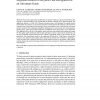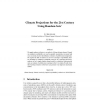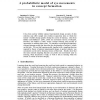39 search results - page 6 / 8 » Probability, rational belief and belief change |
110
Voted
ITS
2000
Springer
15 years 5 months ago
2000
Springer
DT Tutor uses a decision-theoretic approach to select tutorial actions for coached problem solving that are optimal given the tutor's beliefs and objectives. It employs a mode...
137
Voted
UMUAI
1998
15 years 1 months ago
1998
We present an approach to keyhole plan recognition which uses a dynamic belief (Bayesian) network to represent features of the domain that are needed to identify users’ plans and...
108
click to vote
ISIPTA
2003
IEEE
15 years 7 months ago
2003
IEEE
We apply random set theory to an analysis of future climate change. Bounds on cumulative probability are used to quantify uncertainties in natural and socio-economic factors that ...
110
Voted
IJON
2007
15 years 1 months ago
2007
It has been unclear whether optimal experimental design accounts of data selection may offer insight into evidence acquisition tasks in which the learner’s beliefs change greatl...
CORR
2010
Springer
15 years 1 months ago
2010
Springer
We focus on credal nets, which are graphical models that generalise Bayesian nets to imprecise probability. We replace the notion of strong independence commonly used in credal ne...



